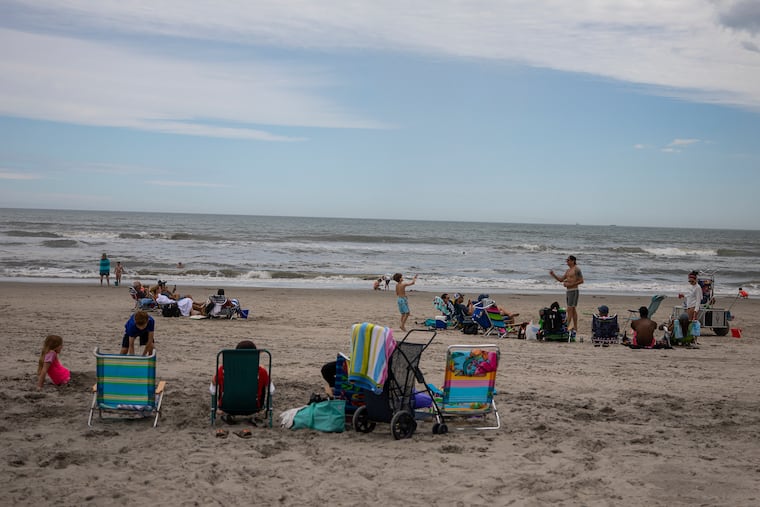Despite coronavirus risks, young people are socializing and cases are surging. Psychologists explain why.
Getting young people, teenagers in particular, to stop meeting their friends because of the risk of spreading coronavirus can be challenging, psychologists said.

Philadelphia announced this week it is halting reopening plans for indoor dining and gyms for at least another month as the number of COVID-19 cases continued to rise, particularly among young Philadelphians. City data showed that 99 people between ages 16 and 19 tested positive the week of June 14 — more than double what was reported in the previous two weeks. Health Commissioner Thomas Farley said the surge is partly due to teens traveling to the Jersey Shore and socializing.
The increase locally mirrors the case surges among young people in the South and the West, particularly in California, Florida, and Texas. And while the elderly usually suffer most from COVID-19′s effects, data from the U.S. Centers for Disease Control and Prevention showed that coronavirus hospitalizations for people 18 to 49 have increased from 27% in the week of March 7 to 35% the week of June 20.
“We’re seeing cases here in people, all of which are young people, who are going to the beach and staying in a beach house,” Farley said. “They’re going to restaurants and bars when they travel. All this is contributing to the fact that the case count is no longer decreasing.”
In New Jersey, positive cases among young people have declined less than in other age groups, said Ed Lifshitz, medical director of the New Jersey Department of Health Communicable Disease Service. While the Shore’s reopening hasn’t directly led to an increase in cases, Lifshitz said that officials are aware of instances in bars and restaurants when social distancing hasn’t happened.
“It’s absolutely a cause for concern,” Lifshitz said.
But getting young people, teenagers in particular, to stop meeting their friends because of the risk of spreading coronavirus can be challenging, psychologists said.
“This is an age group where individuals tend to be focused on immediate rewards and not thinking as much about long-term consequences and costs,” said Laurence Steinberg, a psychology professor at Temple University who studies adolescence. “At this age, individuals are especially responsive to social rewards, and their ability to control their impulses is not as good as it will be when they’re older.”
Steinberg said that even though most teenagers understand the importance of social distancing, the potential of social rewards is more powerful. He described the situation as “an accelerator pressed to the floor without a good brake in place.”
Valerie Braunstein, a psychologist in private practice in Center City who works with adolescents, said that social distancing requirements affect teens differently than adults because it is developmentally appropriate for them to prioritize friendships. She said socially distancing from friends takes a much more negative emotional toll on teens than adults.
“Their task of development is to create social relationships and work on their own sense of identity and autonomy, so when there are barriers in the way of that healthy developmental goal, that can create negative emotional consequences like anxiety, depression, stress, or anger,” Braunstein said. “I think it’s important for everyone to have empathy for that.”
There’s also a heightened sense of loss and grief for teens because of their expectations of how things were going to go — think proms, graduations, summer jobs, and travel — before the pandemic, Braunstein stressed.
“It’s normal for them to be me-centered or self-centered right now,” she said. “It can take more time for them to take others’ perspectives into account because it’s a skill that’s being learned. Parents should allow space for that and ask questions like, ‘How would you feel if you were an adult with a lower immune system and a teen without a mask on came near you?’ to help them learn others’ perspectives.”
Steinberg pointed out that a lot of media coverage has focused on the number of hospitalizations and deaths, reinforcing the message that only older people are severely affected by the virus. He said that this has contributed to teenagers’ false sense of invulnerability.
“By driving home this message of, ‘If you’re younger, you’re not going to die from it,’ it’s making people forget that there are other consequences,” Steinberg said. “Even if young people are unlikely to die from this, they’re still placing themselves at great risk for damaging their lungs and contracting illnesses that are going to be very troublesome, if not fatal.”
Braunstein recommended parents work with teens to establish healthy alternatives to hanging out with their friends, like making sure they have privacy away from family and giving them space. It’s also important to validate how they’re feeling, she said.
“If they have signs of withdrawal, like not enjoying things that would typically be enjoyable, or big shifts in their mood, it might be helpful to reach out virtually to a therapist,” Braunstein said.
Modeling good behavior is also a big part of helping teens understand the importance of social distancing, Steinberg said. When parents aren’t doing what they’re asking their teens to do, it’s going to be hard to persuade them, he said. Plus, there are compromises that can be made, like allowing a teen to identify a few friends who they know have been quarantined for a socially distanced hangout instead of letting them go to a party with people they’ve never met before.
“This is extremely hard on teens because of how social they are,” Steinberg said. “My guess is that most young people know what’s going on and what they’ve been told to do. In some sense, they just can’t help themselves, and it’s an important message to say that in this crisis, the only person who matters is not just you.”